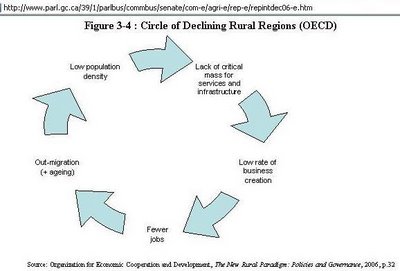Dec. 27, 2006: Rural Poverty
Bumped up
Understanding Freefall: The Challenge of the Rural Poor

Dec. 21, 2006: Rural Canada -- Interim Report
of the Standing Senate Committee on Agriculture and Forestry , December 2006, via newsbeat1
www.parl.gc.ca/39/1/parlbus/commbus/senate
/com-e/agri-e/rep-e/repintdec06-e.htm
Table of Contents
MEMBERS
ORDER OF REFERENCE..
EXECUTIVE SUMMARY..
CHAPTER 1: INTRODUCTION.. 1
Committee Mandate. 2
Addendum.. 4
CHAPTER 2: DEFINING RURAL POVERTY.. 5
Rural Definitions. 5
Poverty Definitions. 7
The Committee’s Approach. 13
Conclusion: Some Statistical Evidence. 14
CHAPTER 3: TRENDS SHAPING RURAL CANADA.. 21
Population and Demographics. 21
Rural Economy. 26
Transportation and Communications. 30
Transportation and Communications Costs. 31
Conclusion. 32
CHAPTER 4: THE CHALLENGES OF BEING POOR IN
RURAL CANADA.. 35
Rural Transportation and Rural Roads. 35
Rural Health and Access to Health Care. 37
Rural Education and Literacy. 40
Government and Private-sector Services. 42
Employment Issues. 43
Immigration. 44
Gender Issues in Rural Canada. 44
The Informal Economy. 46
Low Farm Incomes and its Consequences. 48
Hardship in the Forestry Sector. 51
Conclusion. 52
CHAPTER 5: OPTIONS TO HELP THE RURAL POOR.. 55
From the Agricultural Rehabilitation and Development Act to
Community Futures to The New Rural Economy: A Recap. 56
Rural Economic Development58
Income Policies. 63
Education. 64
Other Policy Options. 66
Conclusion. 69
CHAPTER 6: CONCLUSION.. 71
APPENDIX A: glossary.. 73
APPENDIX B: witnesses heard.. 75
[.... Chapter 1 ....]
The other thing that is different culturally is that there are some strong ideas about self-sufficiency in rural areas. That is one of the reasons why I think poverty is so hidden in rural places. Ideas about self-sufficiency are really important to people, especially men who are farming. — Diane Martz, Research Manager of the Prairie Women’s Health Centre of Excellence, evidence, November 23, 2006
The rural poor are, in many ways, invisible.
They don’t beg for change. They don’t congregate in downtown cores. They rarely line up at homeless shelters because, with few exceptions, there are none. They rarely go to the local employment insurance office because the local employment insurance office is not so local anymore. They rarely complain about their plight because that is just not the way things are done in rural Canada.
The rural poor are also under-researched. With few exceptions, the academic and activist communities have been preoccupied with studying and highlighting the plight of the urban poor.
Canada’s rural poor have rarely been the subject of political attention. [....]
Scroll through the document and note the tables. Don't miss who appeared before the committee. Were your views represented? My comments are in dark blue. Making presentations, there were:
National Anti-Poverty Organization
Agriculture and Agri-Food Canada
Statistics Canada
C.D. Howe Institute
Citizens for Public Justice -- Here, I think of people always asking for other people's money but perhaps unwilling to move to jobs in other areas, or a group concerned with the urban and immigrant areas. Then there is the idea that the poor need government interference. Sometimes, they just need freedom from government interference. When I see the words "Citizens for ..." I make a guess that the justice is not for the rural poor, but for another group--maybe urban voters, maybe to promote leftist ideas, probably heavily influenced by the UN. Perhaps this is unfair of me. Check for yourself.
Centre of Excellence [Prairie] -- Every time I see the term Centre of Excellence, I think of appointees [Liberal, particularly], preferments and awards ... the usual. First, I have noted people are appointed, then an award follows. Any Centre of Excellence I've checked into was heavily laden with Liberals. Enough said.
Universities -- Would these be learned souls -- people who study poverty, perhaps even see the romance in the farm life, but don't live it, don't know the hard work with little remuneration involved? Then, there is the regulatory aspect ... and the control exercised by marketing boards, control which is coercive. Membership should be the result of a free choice.
A few individuals -- How did these particular individuals come to make presentations? By invitation? If so, from whom?
Comment
This is a report worth reading. Too much farm land has been and is being taken out of production, paved over or used for construction. If rural towns, farms and self-sufficiency for our country are to survive, we need to preserve farmland. We must ensure that the farmers are able to make a decent living and can afford to hire help. It must be worthwhile for their families to stay on the farm. We may have to pay more for our food. Perhaps we should. I want to see fields of produce and grains, cows and chickens, pigs and ducks. Don't you? More importantly, given the global threats, we need to ensure that Canada and Canadians are self-sufficient in food within their own country. The family farm is at the base of this.
A small personal example: The above reminds me, I must leave out more Christmas gift food for my wildlife. This holiday, I walked right by a gray or whitish-gray rabbit lying quite contentedly at the base of a decorative pine (Mugo or mungo? pine). I just assumed it was stone as I walked by. Then, I was taken to watch him later as he scampered across the lawn and reached up to eat the lower morsels of another pine. There are threats about rabbit stew, but I don't think so. He had never moved as I walked up the steps earlier, quite content that no-one would bother him. In that same yard, I have watched bluebirds and other creatures. I want wildlife like this to be viable and visible, not far from the door. It is the rural areas that allow it.


0 Comments:
Post a Comment
<< Home